Swords of Iron: Here is what happened on days 1 and 2
Hamas rocket directly slams into building in Ashkelon • 2,315 wounded, over 300 in serious condition
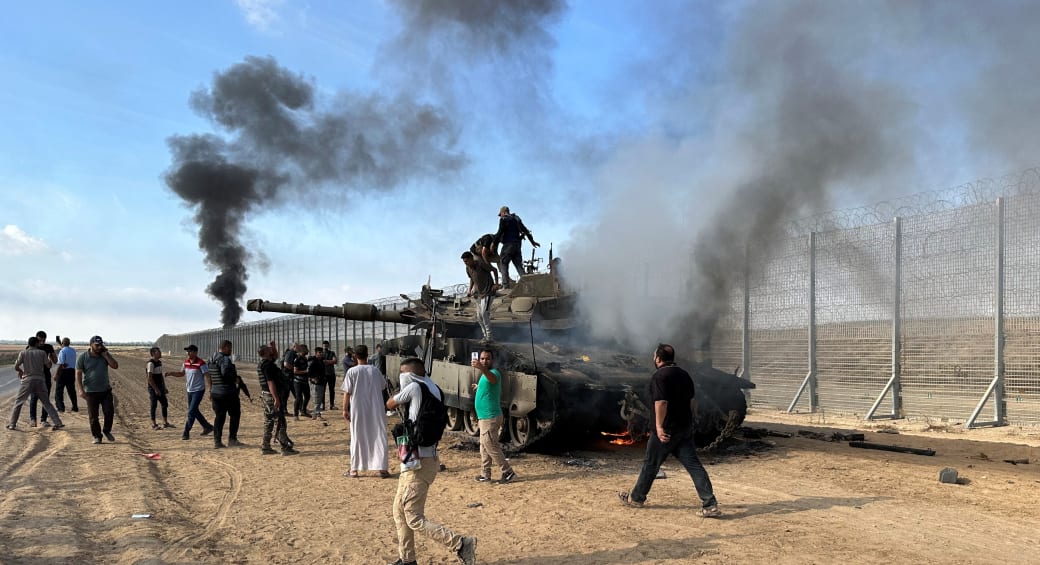
Ambulances will not run within 80 kilometers of Gaza Strip - Health Ministry

The Health Ministry announced that hospitals up to 80 km from the Gaza Strip will not hold ambulatory and elective activities tomorrow.
Employees have also been halted from leaving the country and all leave is cancelled for the foreseeable future. Those already abroad have been asked to return home. This is likely in anticipation of a greater need for emergency services.
So far, 779 injured people have been evacuated to the hospitals as a result of the war that began early this morning.
Merhavim Mental Health Medical Center (Beer Ya'akov) will be opened as a regional center for those suffering from anxiety to respond to anxiety sufferers from the surrounding hospitals.
Go to the full article >>Seventeen Nepali citizens held hostage by Hamas, 7 others injured

Hamas is holding captive 17 Nepali citizens and seven others have been injured in the terror attacks of October 7, the government of Nepal confirmed.
Go to the full article >>Israeli President Herzog: 'Today we saw the true face of Hamas'

Israeli President Isaac Herzog issued a statement on Saturday regarding Hamas's attacks on the country.
“Today we saw the true face of Hamas. A terrorist army whose only goal is the cold-blooded murder of innocent men, women, and children," he said. "Supported and directed by their proxy commanders in Iran, they carried out an unprovoked, heinous attack against the Jewish state on a Jewish holy day. Innocent civilians were massacred and wounded, and many are still under attack.
“The State of Israel will take all measures necessary to eliminate this clear and immediate danger to our citizens. Israel will overcome in the face of all challenges."
Go to the full article >>'Refrain from violence:' US Palestinian Affairs office deleted message to Israel
The United States' Office for Palestinian Affairs has deleted a post that called for Israelis to "refrain from violence and retaliatory attacks" in response to Hamas attacking Israel.
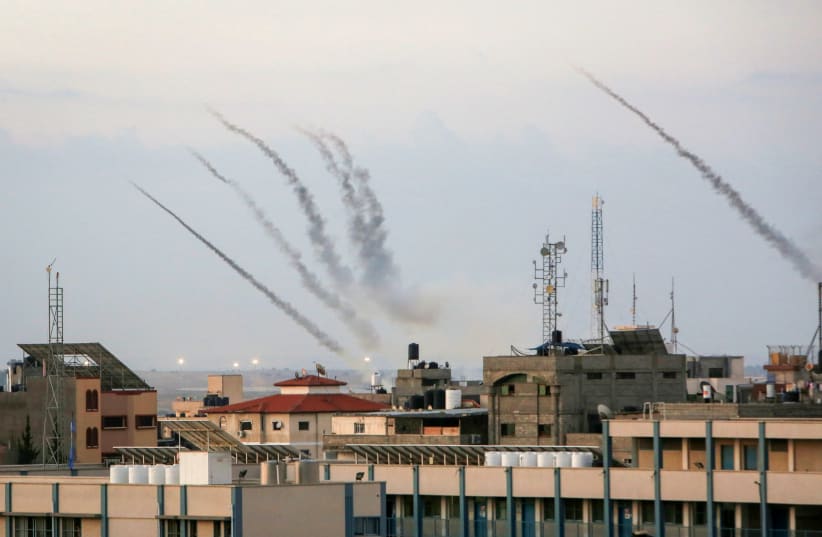
The United States' Office for Palestinian Affairs has deleted a post from their X account that called for Israelis to "refrain from violence and retaliatory attacks" in response to Hamas attacking Israel.
The post on X had said "We unequivocally condemn the attack of Hamas terrorists and the loss of life that has incurred. We urge all sides to refrain from violence and retaliatory attacks. Terror and violence solve nothing."
Deleted, but the internet is forever. https://t.co/Y8uYJC0t3d pic.twitter.com/jzPOHIyXED
— Eitan Fischberger (@EFischberger) October 7, 2023
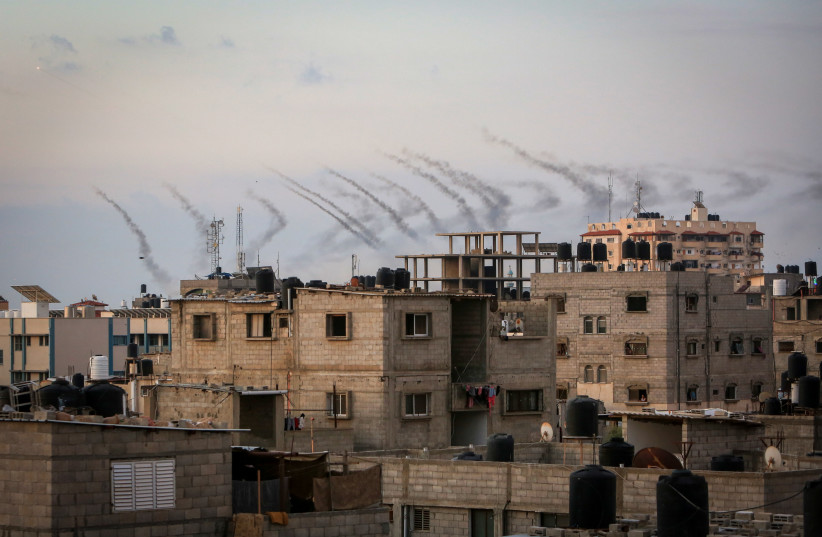 Hamas fires a large number of rockets towards Israel in the city of Rafah in the southern Gaza Strip, October 7, 2023 (credit: ABED RAHIM KHATIB/FLASH90)
Hamas fires a large number of rockets towards Israel in the city of Rafah in the southern Gaza Strip, October 7, 2023 (credit: ABED RAHIM KHATIB/FLASH90)
 Hamas fires a large number of rockets towards Israel in the city of Rafah in the southern Gaza Strip, October 7, 2023 (credit: ABED RAHIM KHATIB/FLASH90)
Hamas fires a large number of rockets towards Israel in the city of Rafah in the southern Gaza Strip, October 7, 2023 (credit: ABED RAHIM KHATIB/FLASH90)Israel is under attack
A barrage of rockets slammed into southern and central Israel Saturday morning, as Hamas terrorists infiltrated the country and took over Southern Israeli towns and Prime Minister Benjamin Netanyahu said that Israel is at war.
"We are at war, not in an operation or in rounds, but at war," the prime minister said in a video statement. The IDF declared its operation "Iron Swords."
Some 22 people were dead, Magen David Adom reported.
Go to the full article >>Ukraine's Zelensky: 'Israel's right to self-defense is unquestionable'

Ukrainian President Volodomyr Zelensky sent his condolences to Israelis amidst Hamas' invasion and assault on the country, in an X post this afternoon.
"Horrible news from Israel. My condolences go out to everyone who lost relatives or close ones in the terrorist attack," Zelensky wrote. "We have faith that order will be restored and terrorists will be defeated. Terror should have no place in the world, because it is always a crime, not just against a specific country or this terror’s victims, but against humanity in general and our entire world. Anyone who resorts to terror commits a crime against the world. Whoever finances terror is committing a crime against the world.
"The world must stand united and in solidarity so that terror does not attempt to break or subjugate life anywhere and at any moment. Israel's right to self-defense is unquestionable. All details surrounding this terrorist assault must be revealed so that the world knows and holds accountable everyone who supported and helped carry out the attack. All Ukrainian citizens who remain in the risk zone must carefully obey all orders issued by local security services and remain vigilant. Please be cautious.
"The Ukrainian Ministry of Foreign Affairs and our embassy in Israel are ready to assist in any situation. To support Ukrainians in Israel, we established an operational headquarters. If you require assistance, please contact any of our diplomatic or consular offices in any convenient and accessible manner. Every life is valuable! We condemn all forms of terrorism."
Horrible news from Israel. My condolences go out to everyone who lost relatives or close ones in the terrorist attack. We have faith that order will be restored and terrorists will be defeated.
— Volodymyr Zelenskyy / Володимир Зеленський (@ZelenskyyUa) October 7, 2023
Terror should have no place in the world, because it is always a crime, not just…
Go to the full article >>
Families search for loved ones: 'I don't know where my daughter is'
Nearly 300 casualties are hospitalized in Israel's south.

Hundreds of family members of the missing, injured, and those who sought updates on the well-being of their loved ones after the sudden attack by Hamas had arrived at Soroka Medical Center in Be'er Sheva the previous Saturday afternoon.
Some of them were residents of the Bedouin communities.
They were also parents of children who had participated in a nature party that was attacked by the terrorists. Meanwhile, several families had been informed of the deaths of their loved ones, and cries of brokenness had been heard at the entrance to the hospital.
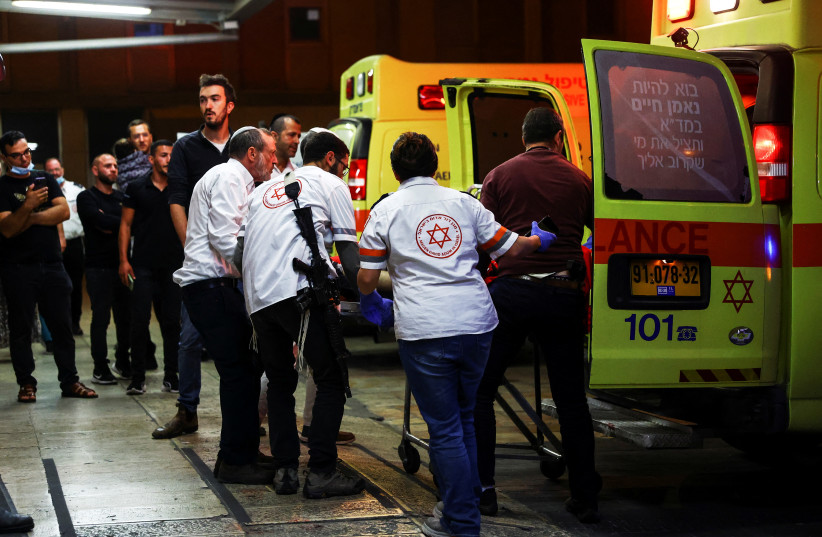
"I lost contact with my daughter a few hours ago; she sent me a selfie from the hiding place during the calls," the father of one young girl who had been at the nature party said. "They were asked to disconnect their phones. I didn't know her condition or her whereabouts. They told us they were bringing her to Soroka."
At the entrance to the hospital, dozens of Magen David Adom (MDA) and United Hatzalah ambulances had brought in wounded individuals on stretchers. They left them at the emergency room and then returned to the field.
Weeping family members
In the hospital's corridors and entrances, dozens of worried and weeping family members sat, trying to inquire and receive information about the condition and whereabouts of the wounded.
By that point, more than 280 wounded individuals had been brought to Soroka, including those critically injured. At least 60 were in critical to severe condition, and 44 were in moderate condition. The hospital had expanded the number of stations in the trauma room and opened additional intensive care beds.
J., who worked at the medical center, told Walla!: "I was called in for a shift, and the flow of wounded individuals didn't seem to end. All morning, I had been overwhelmed and talking to friends from the communities near the Gaza border who had been attacked. It was hard to grasp that for three hours, no one had come to help them."
A resident of Rahat had talked about how his family members were affected by one of the incidents in the Gaza envelope. "A woman was killed, and several young people were injured. Some of them had arrived here, and some were still missing. Maybe they were still in the field, or maybe they had been kidnapped. I didn't know what happened to them. They were on their way back from work," he told Walla!.
At the same time, Barzilai Medical Center in Ashkelon had received 182 casualties, including 12 in critical and 6 in severe conditions. Another 107 victims were in moderate condition, and 41 were classified as minor injuries. Asuta Hospital in Ashdod was treating 26 casualties, seven in serious condition, most of whom had gunshot wounds.
Go to the full article >>How lulled attitudes to Gaza led Israel into a terror-filled nightmare - analysis
It’s unclear what comes next, and whether this attack will be seen as similar to the shock of 1973, or the sense of failure some felt in 2006 during the war in Lebanon.
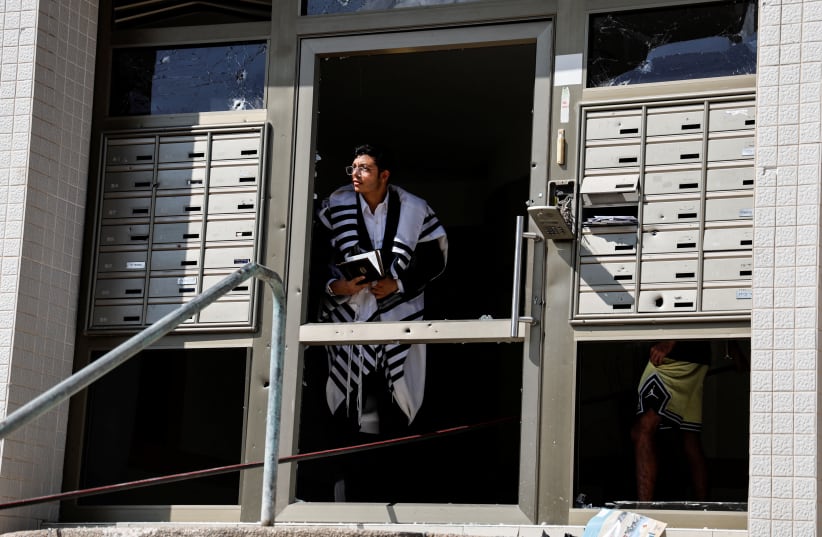
We were awakened by sirens in Jerusalem this morning at around 8:15 in the morning. It was unusual. It was also unbelievable that rockets would be fired at Jerusalem without warning.
In past conflicts, such 2012 when rockets first targeted the city, and in 2014 and 2021, there was a long lead-up to the attack. Today the silence was pierced and there was a profound sense of lack of security, and a sense of a major change in the kind of conflict we are facing.
The scenes of attacks by Hamas terrorists along the Gaza community is something out of nightmares. Hamas has been trying to infiltrate communities along the border in the past, and use tunnels to launch attacks, but Saturday, October 7 was a different kind of attack. The large number of points of infiltration and the fact that terrorists entered communities and paraded around, taking videos of themselves next to destroyed vehicles or next to victims of their attacks, brings an immense feeling of lack of security.
How did we get here?
Hamas is an enemy that is well known. Israel has been fighting Hamas for decades. During the Second Intifada the group began to increase its abilities, using rocket and mortar fire to terrorize civilian communities in Gaza and on the border of Gaza. After Disengagement, Hamas began to stockpile rockets and weapons. It used these to conduct the raid in June 2006 in which IDF soldier Gilad Shalit was captured. He was held in Gaza for five years.
After 2006 Hamas continued to fire rockets at southern Israel, targeting Sderot and communities near the border. Hamas expanded the range of its rockets, striking Ashkelon for the first time in 2008. The rocket fire led Israel to launch Operation Cast Lead, and a ground incursion into Gaza. There had been several smaller operations before this major conflict, including Summer Rains and Hot Winter, but 2009 appeared to be a turning point in the size of the conflicts to come.
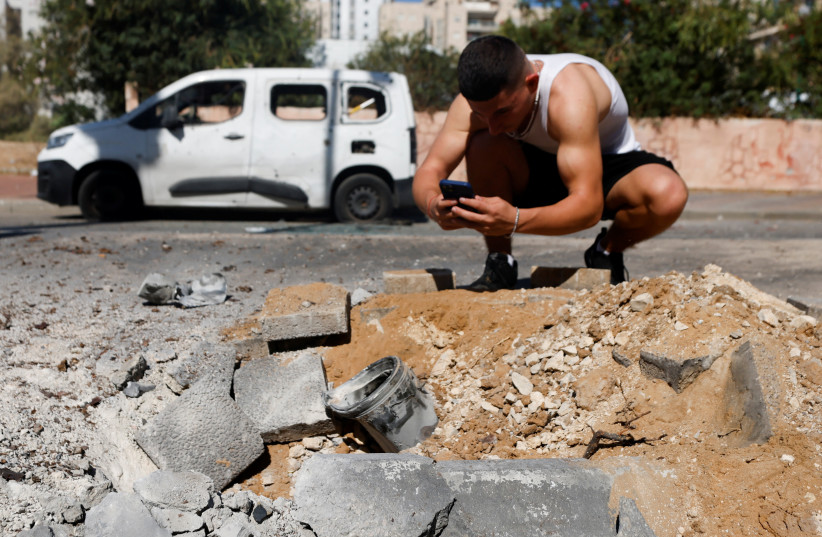
Hamas benefited from the Arab Spring and the chaos that unfolded in Libya and in Sinai, importing more weapons and stockpiling an arsenal of rockets. By 2012 the terror group felt confident enough to launch rockets at Tel Aviv and Jerusalem during the operation Israel dubbed Pillar of Defense. Here, Hamas and Israel stepped back from the brink of another ground incursion. Hamas was also shifting resources at this time to build tunnels. The tunnels were for smuggling but Hamas also began to try to tunnel under the border of the Gaza Strip to strike at Israeli communities. In the next round of fighting in 2014 Israel destroyed at least 34 tunnels and struck thousands of targets in Gaza. At the time Hamas had an arsenal of some 10,000 rockets and many of them were destroyed or used in the war. Iron Dome was now increasingly a key to Israel’s defenses as the volume of rocket fire increased in each conflict. For instance, Hamas fired more rockets in just a few hours on October 7, 2023 than it did in many of the early multi-day conflicts with Israel.
A turning point: The 2014 war
The 2014 war marked a kind of turning point. The tunnel threat showed how Hamas wanted to try to get under the border and threaten Israeli communities, such as the kibbutzim and moshavim along the border. In addition Hamas used sea-borne commandos to try to infiltrate a beach near Zikim. They were neutralized by Israel.
After 2014 there was a shift in Israeli strategy. Ground incursions ended and Israel used its air force increasingly to conduct precision strikes in Gaza. In general the large number of casualties of the 2009 and 2014 wars would not be seen again. In addition Israel focused efforts on Palestinian Islamic Jihad, as Hamas sometimes preferred to stay out of conflicts on the border. There were exceptions, such as Operation Guardian of the Walls, when Hamas fired rockets at Jerusalem in 2021. More representative of the era 2014 to 2023 was Operation Black Belt, which began with the targeting of PIJ commander Baha Abu al-Ata.
However, there were disputes about how best to handle Gaza. Defense Minister Avigdor Liberman resigned in November 2018 because he opposed a ceasefire in Gaza. It’s important to understand this because over the years Gaza took on secondary importance to other issues. A new smarter security fence was built and Israel attempted to prevent tensions in Gaza from spiraling into conflicts. This was not always successful, but in general Hamas threats were checked. Hamas resorted to new tactics, launching a wave of riots and protests along the fence in 2018, which it dubbed the ‘Great Return March.’ However, Hamas threats appeared to fail. Nevertheless it also appeared that it could heat up the border whenever it wanted and the number of short-term operations, such as Shield and Arrow in May 2023, seemed to occur with increasingly regularity.
Gaza was on the back burner in terms of a sense of security threats because Iran-backed proxies have been increasing threats elsewhere. For instance, after 2018 when the Syrian regime returned to the Golan and defeated the Syrian rebels there, Iran-backed proxies have been active closer to the Golan. Iran has also been working with Hezbollah and Hezbollah has increased its arsenal of weapons and its power. Iranian-backed militias in Iraq have also increase their threats and Iran uses them to support a network of pro-Iranian outposts across Iraq and into Syria. As such the big threat is Iran and its proxies. Israel even launched a short operation in Jenin in July. Hamas in Gaza appeared isolated, unable to even get more funds from the usual sources, such as Qatar. With Israeli normalization agreements growing in the region, Hamas seemed to present an outdated ideology living in the past.
This seems to have lulled people into a false sense of security. I spent time on the Gaza border covering wars since 2009. Prior to that I was also on the border during the Disengagement. While rocket fire increased, the success of Iron Dome also appeared to provide adequate protection.
Much of that sense of security has now been shattered. The massive attacks on October 7 led to chaos at the border and a meltdown in the sense of security. It’s unclear what comes next, and whether this attack will be seen as similar to the shock of 1973, or the sense of failure some felt in 2006 during the war in Lebanon. Will it reshape thinking about the challenge Hamas poses in Gaza? Despite numerous rounds of conflict, Hamas continues to pose a large threat through rockets and now has shown that it can coordinate deadly attacks on the ground. Hamas has shown in the past that it can kidnap and hold hostages. It did that with Shalit and also Hamas continues to hold two Israelis; Avera Mengistu and Hisham al-Sayed and it holds the bodies of IDF soldiers Oron Shaul and Hadar Goldin, who were killed in 2014. Hamas has enjoyed the privilege of running Gaza and threatening attacks at times of its choosing. It is unclear if that privilege will now come to an end.
Go to the full article >>Israel at War: 40 people dead, more than 700 wounded
Operation Swords of Iron commences.

A barrage of rockets slammed into southern and central Israel Saturday morning as Hamas terrorists infiltrated the country and took over Southern Israeli towns.
Prime Minister Benjamin Netanyahu said that Israel is at war.
"Since this morning, the State of Israel is at war," Prime Minister Benjamin Netanyahu said, shortly after the IDF declared "Operation Swords of Iron."
Some 44 people were announced dead by afternoon and more than 700 wounded by Magen David Adom. Among them, Ofir Liebstein, head of the Sha'ar Hanegev Regional Council, was killed in an exchange of fire with terrorists.
Liebstein was killed as he defended his settlement during an attack. Deputy head of the council, Yossi Keren, is currently filling his place.
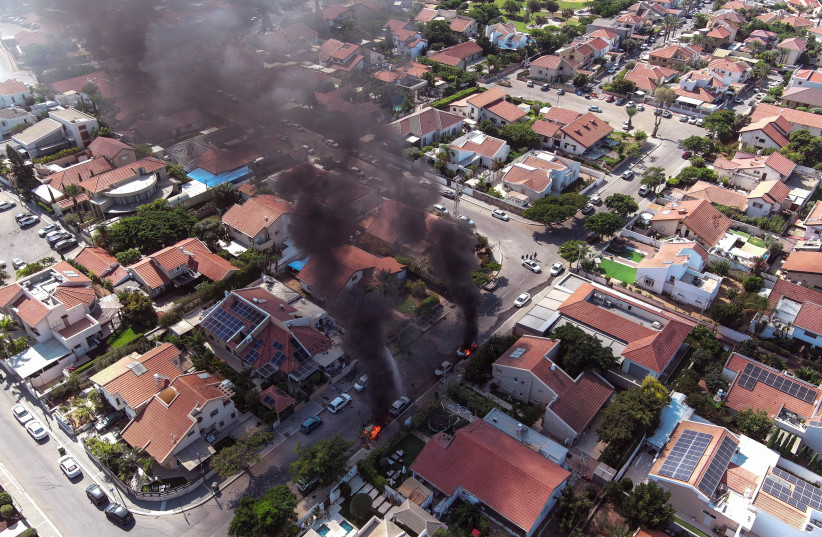
A second Israeli - a woman in her 60s - was killed when a rocket hit her building in the Gederot Regional Council.
The names and identities of the other victims had not yet been released.
More than 2,200 rockets were fired, the IDF said. Sirens sounded multiple times in Jerusalem, Tel Aviv, and southern Israel.
A direct hit was reported on a building in Ashkelon. Dozens of vehicles also caught fire in the city.
In Ramla, four civilians who were trapped under a damaged building were rescued by the Israel Fire and Rescue personnel.
Shelters were opened across the country. Many parts of Ashkelon and the surrounding were without electricity.
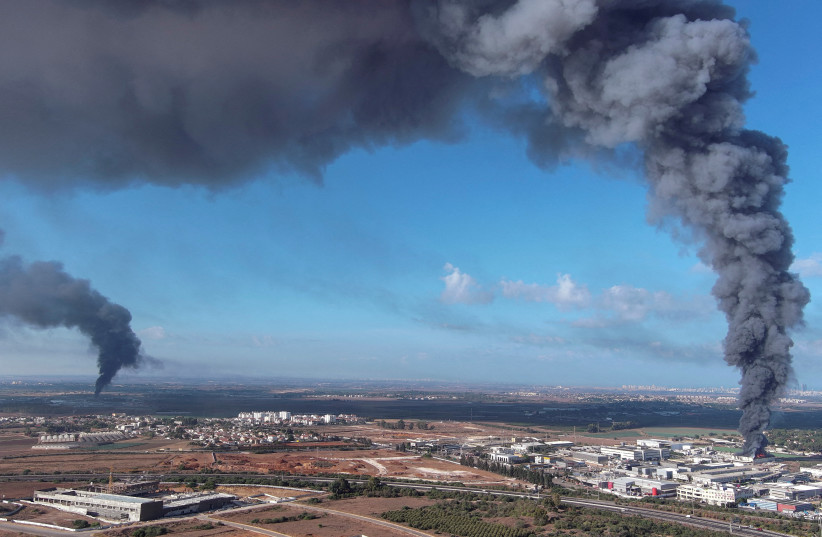
"We urge residents to stay in protected areas, avoid approaching the scenes, and refrain from touching rocket remnants that may contain explosives or similar hazards," Israel Police said.
"The public is urged to follow the instructions of the Home Front Command to stay close to protected areas, and residents of the Gaza periphery are requested to stay indoors," the army requested.
'The State of Israel will win this war’
"The Hamas [terrorist organization] has made a grave mistake this morning and launched a war against the State of Israel. IDF troops are fighting against the enemy at every location," said Defense Minister Yoav Gallant following a situation assessment, as the IDF struck back with multiple forces.
Dozens of fighter jets and other aircraft of the IDF targeted 17 military facilities and four operational headquarters of the Hamas terrorist organization throughout the Gaza Strip, the IDF said.
Gallant approved the draft of reserve soldiers per the IDF's requirements. He also announced a "special security situation" in Israel's Homefront, within a 0-80 km radius of the Gaza Strip. This status enables the IDF to provide civilians with safety instructions at close relevant sites.
"The State of Israel will win this war," Gallant added.
מבצע "חרבות ברזל"
— צבא ההגנה לישראל (@idfonline) October 7, 2023
עשרות מטוסי קרב וכלי טיס נוספים של צה"ל תקפו בשעות האחרונות 17 מתחמים צבאיים ו-4 מפקדות מבצעיות של ארגון הטרור חמאס ברחבי רצועת עזה pic.twitter.com/ZM91Adym0v
In addition to the rockets, Hamas had infiltrated into the country, including reportedly into an IDF base in Israel's southern district, according to an unnamed Israeli security source. Contact with the soldiers on the base was cut off.
Hamas terrorists entered several Israeli towns, where gunfire was exchanged.
A shootout occurred at the Sderot police station and at least one southern Gaza kibbutz.
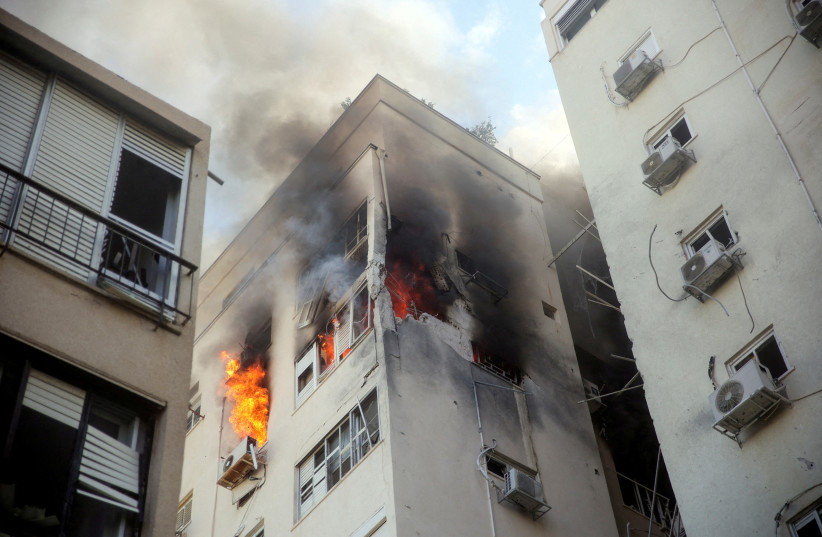
A resident of the Nirim kibbutz bordering Gaza told Maariv: "Terrorists are passing through the kibbutz. They tried to enter my house. They keep trying to break into houses."
Terrorists had also reportedly infiltrated the city of Ofakim, and exchanges of gunfire were heard.
The terrorists were allegedly fortified in buildings. By noon, some of the terrorists had returned to the Gaza Strip.
N12 reported that Hamas terrorists had captured Israeli vehicles and returned to Gaza with them.
Furthermore, Hamas claimed to have kidnapped five IDF soldiers, but the IDF had not yet confirmed the report. Israeli media reported that Hamas had 33 war prisoners, including civilians and IDF soldiers, who were being held hostage.
Official response
Israeli officials held a security meeting in the afternoon and updated the public on Israel's military plans.
"Our first goal is primarily to clear the territory of the enemy forces that have entered and restore security and calm to the settlements that have been attacked," Netanyahu said. "The second goal, concurrently, is to exact a heavy price from the enemy, even in the Gaza Strip. The third goal is to fortify other areas so no one mistakenly joins this war."
Injured seek medical attention
Hundreds of Israelis sought medical attention at hospitals throughout the country.
Magen David Adom (MDA) said it had treated dozens of people throughout the country, including many in critical condition. In addition, MDA teams provided care for victims of anxiety and other minor injuries resulting from falls on the way to shelters.
Some 280 people with varying degrees of injuries were evacuated to the Soroka Medical Center for treatment, including 44 in moderate condition and 60 in serious condition.
A total of 21 people received treatment at Kaplan Medical Center, the hospital said. Four others were in moderate condition, and 15 were lightly injured. Some injured had gunshot wounds, some shrapnel injuries, and some suffered shock.
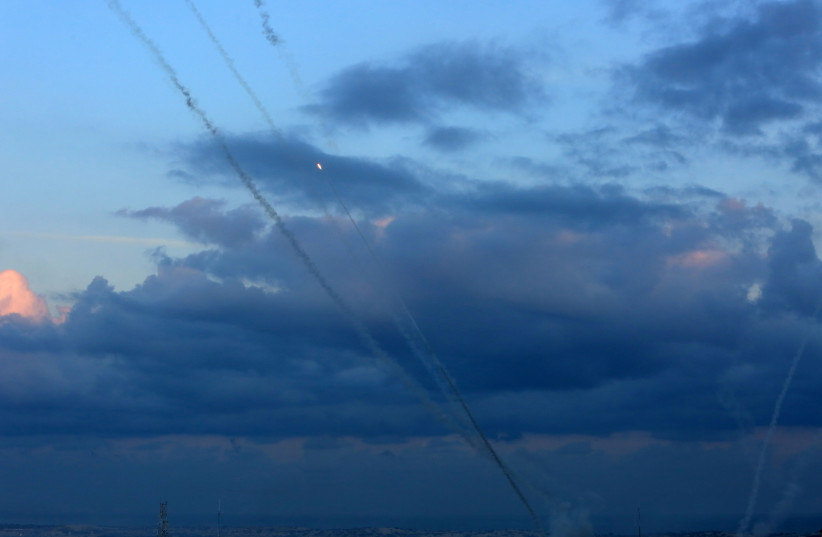
Asaf Harofeh said it treated 33 people: two in serious condition, two in moderate condition, and the rest with mild injuries. Samson Assuta Ashdod Hospital said they had treated four injured people from rocket fire, among other hospitals. Two people wounded by rocket fire were evacuated to the Sheba Medical Center for treatment.
Hadassah Medical Center in Jerusalem said 23 people were being treated, including one in life-threatening condition. Finally, 136 people with varying degrees of injury were evacuated to the Barzilai Medical Center for treatment.
Politicians speak out
As the war waged on, Israeli officials from across the spectrum spoke out.
"The State of Israel is facing a difficult hour," said President Isaac Herzog. "I stand with the IDF, its commanders, soldiers, and all the security and rescue forces. I want to send words of encouragement and strength to all the residents of Israel who are under attack.
"I call upon everyone to listen to the instructions of the Home Front Command, to show mutual support, and to stay resilient," the president continued. "Together, we can overcome all those who wish us harm."
National Unity Party leader Benny Gantz said, "Hamas made a grave mistake, and they will bear the consequences. All citizens of Israel stand behind the IDF and the security forces, and the government has full backing to exact a heavy price for any determined and responsible action.
"We will remain attentive, united, and deliver a heavy and painful blow to the enemy," he continued.
Lapid stated that he would announce that he would support a military response to the broad attacks against Israeli citizens.
However, Labor Party leader Merav Michaeli wrote on X: "Today is Netanyahu's Yom Kippur - a terrible and shameful failure, and a tough morning. To start Saturday and the holiday morning, children run to the stairwell with terrible reports about what is happening in the southern settlements."
Yisrael Beytenu leader Avigdor Liberman stated, "Our strength is our unity. Fifty years since the Yom Kippur War, we once again find ourselves in a war for the home against the enemy. The Israeli government must exact a heavy price from Hamas."
Protest leaders also reacted, calling off the evening's demonstration in Tel Aviv.
"We stand by the IDF and the security forces carrying out their duties during this difficult time and hope for the restoration of calm and security," the Kaplan Force said.
Brothers in Arms and Forum 555 also called on their followers to support the IDF and fight for Israel's security.
"We call on everyone who is required to stand up for the defense of Israel to do so without hesitation and immediately," Brothers in Arms said in a statement. "Right now, the most important thing is the country's security."
Go to the full article >>Benjamin Netanyahu: 'I call on all Israelis to unite to achieve victory in this war'

Benjamin Netanyahu said on Saturday at a cabinet meeting that "since this morning, Israel has been in a war.
"Our first goal is first of all to cleanse the area infiltrated by the enemy forces and restore security and peace to the settlements that were attacked.
"The second goal, at the same time, is to exact a huge price from the enemy, for their attacks. The third goal is to fortify other arenas so that no one makes the mistake of joining this war.
"We are at war, and in war you have to keep calm. I call on all citizens of Israel to unite to achieve our highest goal - victory in this war."
Go to the full article >>Israel braces for cyber attacks amidst attacks from Hamas

Rumors about a cyber attack on Israel have been circulating in recent reports amidst rocket strikes and Hamas' invasion of Israeli towns on Saturday morning.
There has not yet been any cyber attack on Saturday, but Israel is prepping for such an attack.
This is a developing story.